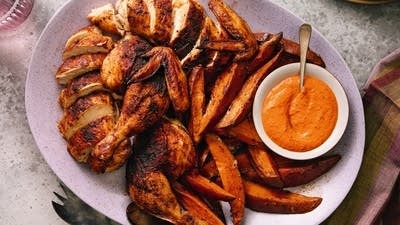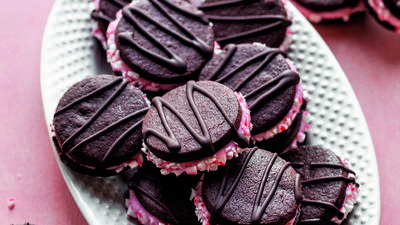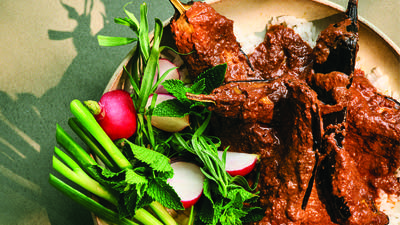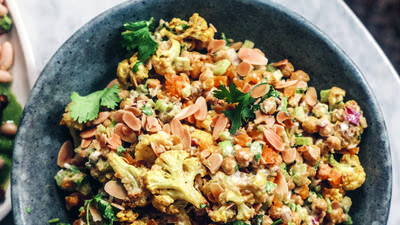
In an extended interview with host Francis Lam, chef Zoe Adjonyoh recalls her childhood fascination with the food from her father's home country - Ghana. She and Francis also discuss her personal travels to the West African nation in search of more experience with the methods and unique ingredients used in Ghanaian cuisine, and how it all comes together in her debut cookbook Zoe's Ghana Kitchen. Hear more from their interview at our story page for "Aromatic, wholesome African cuisine inside Zoe's Ghana kitchen." Try Zoe's recipes for Shito (Hot Pepper Sauce), Chalé Sauce, Peanut Sauce, and Yam & Plantain Peanut Curry.
Francis Lam: I want to talk to you about Ghana, because you were there when you were a young child, you spent a few years there, but you grew up in London. Your father's Ghanaian and your mother is Irish.
Zoe Adjonyoh: Yeah.
FL: Before you get to Ghana, you learned to cook Ghanaian food, it seems, sort of on your own. Your father didn't really teach you that, that much. So, tell me about how you learned to cook Ghanaian food.
ZA: Yeah, my introduction to Ghanaian food was through my father. He used to bring home these amazing ingredients, such as kenkey, which is fermented maize, and banku and whole tilapia and shito and lots of exotic things. But he would just cook for himself. I used to have to prod him a bit to get him to engage with me about letting me understand what that food was, and after a while of nagging, he would let me cook beside him. He wasn't a particularly good cook. He burnt a lot of things, to be honest, but that's where the sort of interest and passion for the food came from. I realized that was his way of connecting to home, which is partly why he didn't really feel like sharing it that much, oddly. But then I thought it was a great route for me to be connected to that part of my culture as well, because we didn't have any Ghanaian family in London, whereas my Irish side was quite well established. We went to Ireland very regularly, so I understood that part of my culture and heritage, whereas Ghana was a bit more mysterious to me because my dad was a little bit more mysterious. Then over the years, I used to cook with him a bit, and really loved cooking. I cooked a lot as a kid, and I just kept repeating those recipes over and over again; occasionally I'd cook them for friends and things like that. The peanut butter stew dish, which is based on ground nut soup - something that people nag be about all the time - it's kind of the dish that launched Zoe's Ghana Kitchen as a business. It got to a point when after the first year of doing supper clubs and stuff, I had a whole cache of six recipes that I was trotting out again and again.
FL: And these are the ones that you've been cooking since a child.
ZA: Then I was like, "Okay, so I need to expand my repertoire." I'm lucky. Where I live in East London, I'm very close to a market called Ridley Road, which is a great African market, so there's lots of West African grocers down there. I had lots of conversations with the women down there. In Ghanaian culture, we call older women “aunties.” I had lots of aunties down Ridley Road who would explain ingredients to me, and I'd ask them questions about how to cook things. There was some exploration going on there as well, but I really felt like it was important to go back to Ghana for two reasons. I was doing my MA at Goldsmiths at the time in creative writing and writing about identity and my relationship with my dad, and then I thought, kill two birds with one stone to go home to Ghana and dig out those recipes, meet my family and find out more about where my dad comes from, find out more where I come from. I had this amazing experience, because it was such a hospitable place, aside from the fact that I had a hundred relatives greeting me, all of whom invited me into the kitchen to show me things. My aunt Evelyn, my grandma Mercy. Just traveling around and going to things like chop bars. A chop bar is basically a roadside eatery, a bit like a warung that you'd get in Bali or Indonesia. I would just go in there and eat, and then I'd say, "Oh my god, that was amazing, can you show me how to cook it?" and people were super, super generous. I got access to lots of people's kitchens. It was fantastic. It was such a great trip. I wish I could repeat it. Everything I learnt from that trip came back to inform my cooking at home, and some of the interesting things about that trip was it gave me a lot of permissions that I wasn't sure I should have at home.
A lot of my cooking is reimagining dishes as well, because I love the traditional stuff, but I'm also all about the flavors and the ingredients and finding new ways to use them. So, before I'd gone back to Ghana, I was a little bit self-conscious about whether I had license to do that or not, you know? And one of the things I took away from that trip was the fact that in my grandmother's house, three different women showed me three different ways to make jollof and all of their jollofs were the best jollof, you know? According to them, the variances between eating okra soup or light soup in Accra versus eating it in Volta, you know, it just reinforced for me that these dishes do change from region to region but also from household to household, you know? There is some license there to reimagine them a little bit and reinterpret them your own way. Just the amount of amazing, fresh vegetables and spices and the commonality of spices that I didn't think would be available in Ghana, things like thyme and so much fresh stuff. And the tarro. That inspired me as well in my cooking, because when my dad cooked as a kid, he used a lot of - I don't know if this is due to him being a bit not a very expert cook or a bit lazy- but a lot of tin stuff, you know? So, like tin sardines or things like that. So, having access to all this knowledge about how much fresh ingredients and herbs and spices I wasn't expected to find also reinforced for me that it's okay to use garlic and thyme in some of these dishes because Kaneshie market has these things, you know?
FL: So you're doing this dual thing of learning about the cuisine as it exists in the place and connecting to it and feeling it sort of course through you, but as you go back to your home in London and experiment, are there lines you won't cross? Are there things like, "Well, I can't do that," or "Won't do that, because I think that violates the spirit of it or something."
ZA: Yeah. A big one for me, is “red red,” because for me, red red is called red red, because it's red twice because of the tomatoes and because it's used with a particular oil - the red oil.
FL: Oh, the palm oil! That's super bright.
ZA: It's very orange, and it has that very earthy taste to it. It's a very distinct flavor. But that taste defines red red for me. There’s a valid argument about sustainability issues and things like that, but you can find sustainably farmed palm oil, and when you're in Ghana using it for the sauce because you're pounding the nuts to get the oil. I would never cook it without using zomi or palm oil, because that flavor really defines it. It's perfectly acceptable, if you're not down with that, to use keratin or rapeseed. In terms of license to experiment, I think there shouldn't be any restrictions on how you use these ingredients, because the whole point is to make it as accessible as possible. And the more people you can get using the ingredients in new ways or incorporating them into their daily diet, the better. For me it's like, here's a traditional recipe, here are some traditional ingredients, and this is how some people use them, but how about trying to do this, this, this and this with them as well, because they're versatile, actually, you know?
FL: Yeah. And in that way, you know, this is how you spread the cuisine. Well thanks so much for talking with us, Zoe.
Before you go...
Each week, The Splendid Table brings you stories that expand your world view, inspire you to try something new, and show how food connects us all. We rely on your generous support. For as little as $5 a month, you can have a lasting impact on The Splendid Table. And, when you donate, you’ll join a community of like-minded individuals who love good food, good conversation, and kitchen companionship. Show your love for The Splendid Table with a gift today.
Thank you for your support.
Donate today for as little as $5.00 a month. Your gift only takes a few minutes and has a lasting impact on The Splendid Table and you'll be welcomed into The Splendid Table Co-op.




